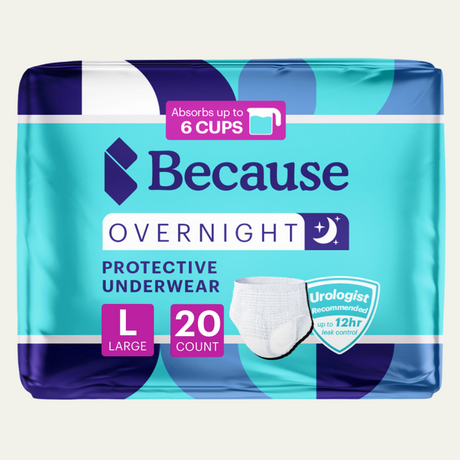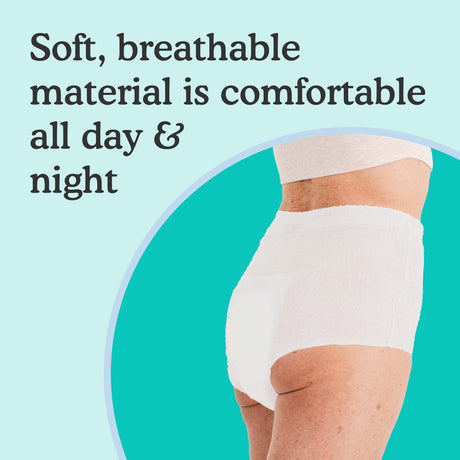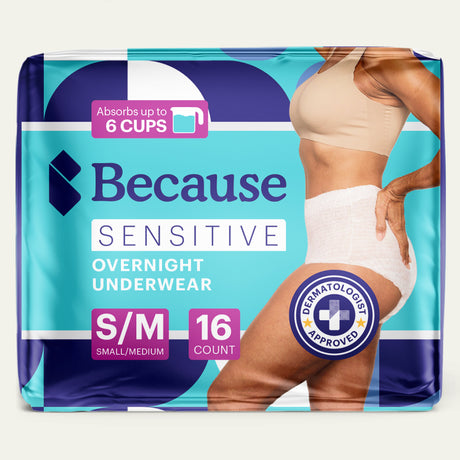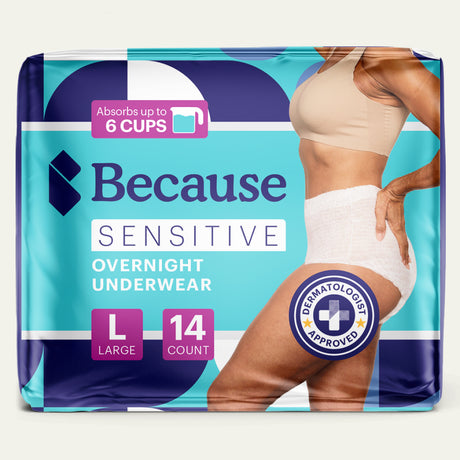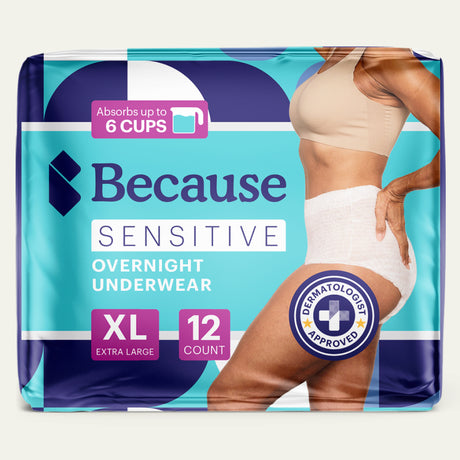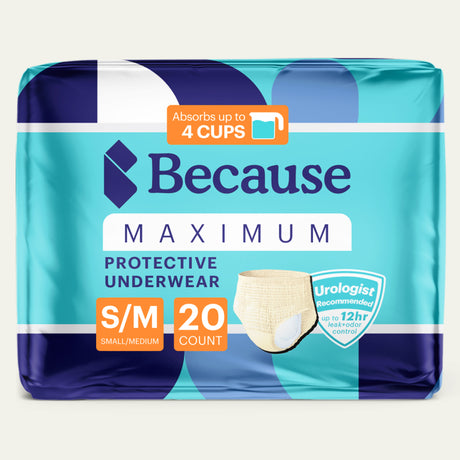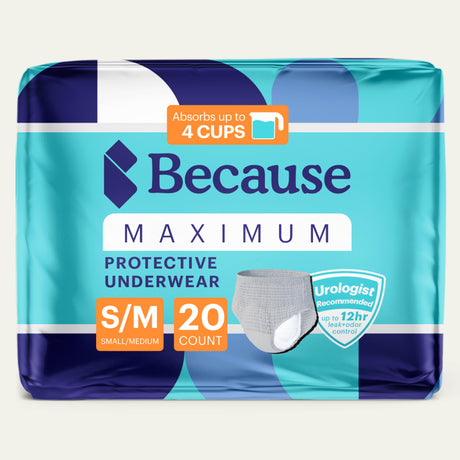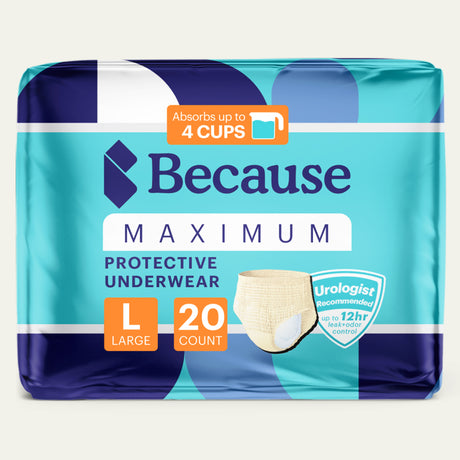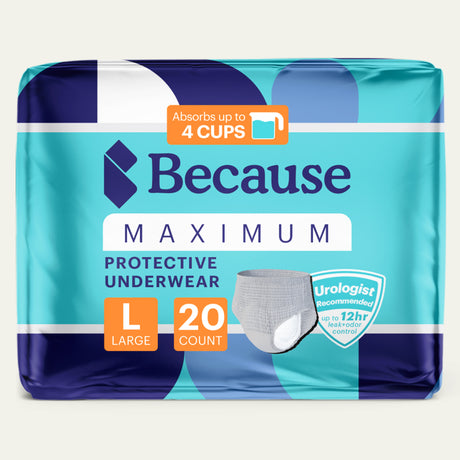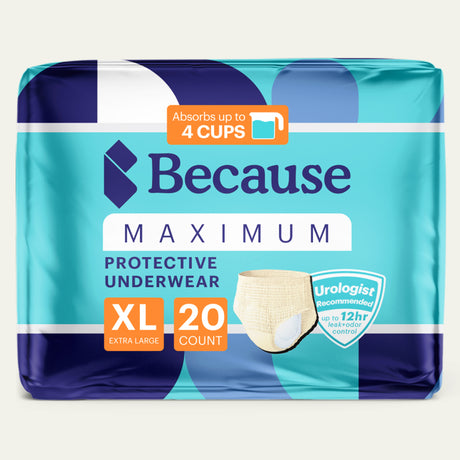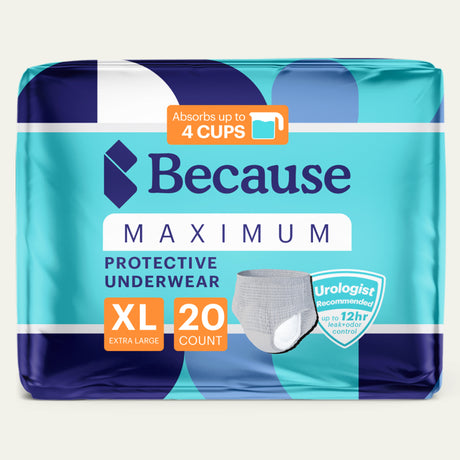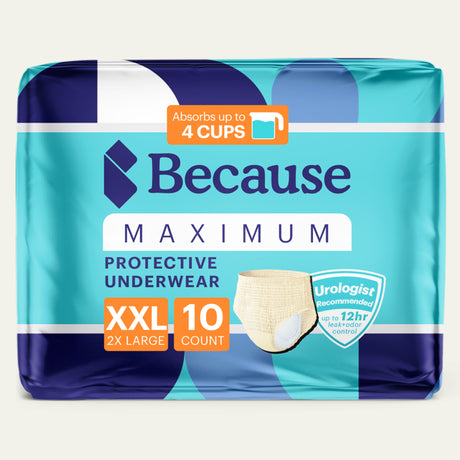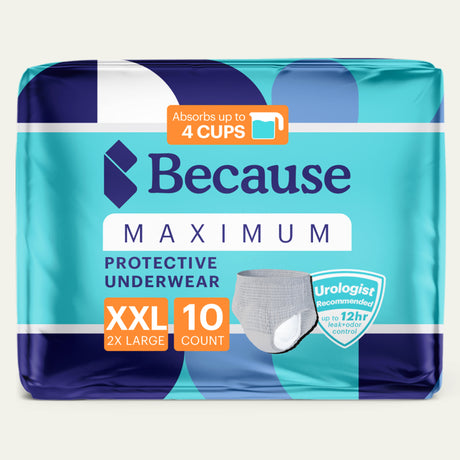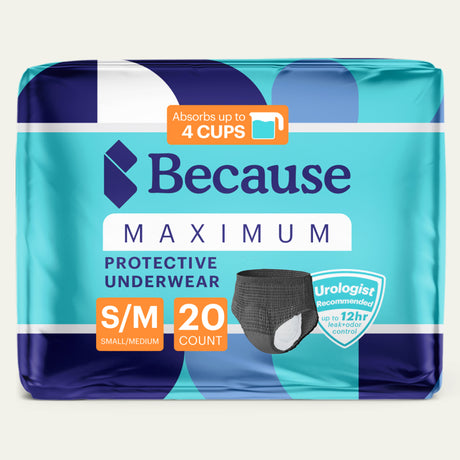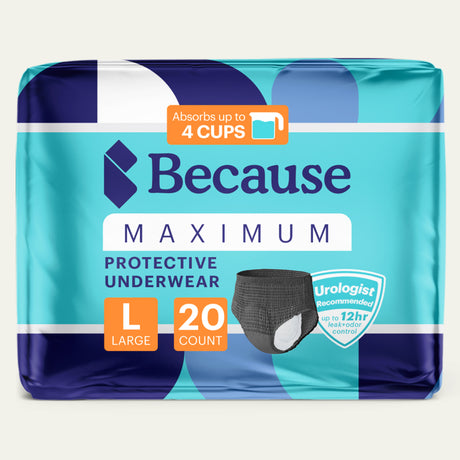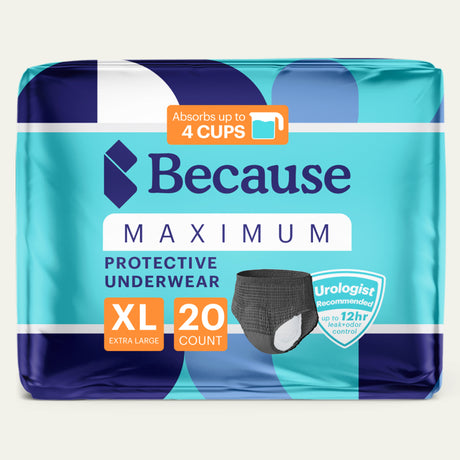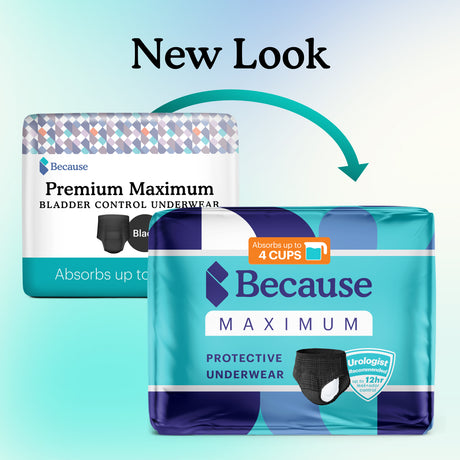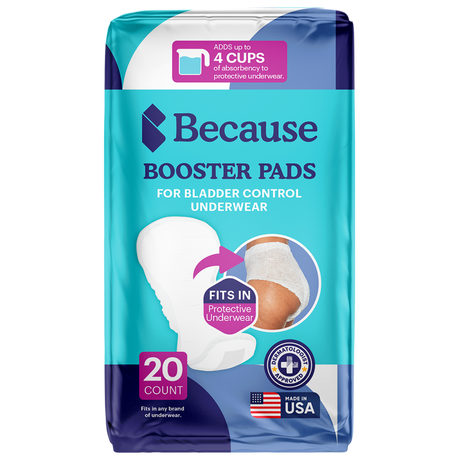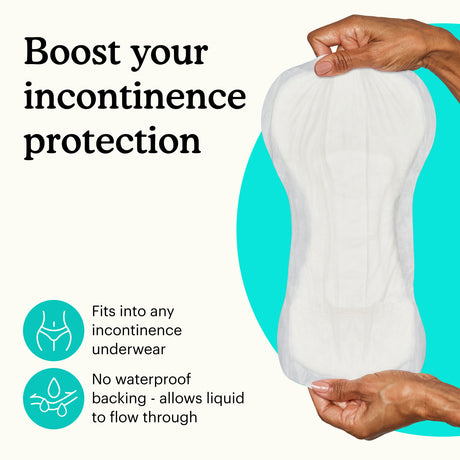Medically reviewed by Dr. Temitope Rude, MD
A poll conducted by the University of Michigan and AARP found that only 12% of women aged 65 to 80 said they were interested in sexual activity, compared to 50% of men. There are many potential causes for this dramatic difference. Surprisingly, concerns about urinary incontinence is among them. Research shows that women with urinary incontinence are more likely to abstain from sex, and the risk of the condition increases with age.
Bladder leakage or urinary incontinence can arise due to a number of factors, and some women do experience it after sex. If you’re one of them, you may wonder if sexual activity is the cause or if something else is at play. In this post, we’ll explore the connection between sexual intercourse and incontinence and discuss what you can do about a weak bladder after sex.

Is It Common to Have a Weak Bladder After Sex?
So far, there have been no large studies to determine how many women experience incontinence problems after sex. However, the type of incontinence most commonly associated with urine leakage after intercourse, stress incontinence, is one of the most common forms that affects women.
One cross-sectional study concluded that nearly a third of all women with incontinence have stress incontinence and that another third experiences mixed incontinence, which is when stress incontinence occurs with another type of urinary incontinence called urge incontinence. We’ll discuss what these conditions are and what causes them later in this post.
What Causes a Weak Bladder After Sex?
Bladder leaks after sex can occur for a few reasons. Let’s explore each of them.
Weak Pelvic Floor Muscles
As previously mentioned, a weak bladder after sex often arises due to stress incontinence. To understand this condition, you first need to know a bit about the lower urinary tract. It consists of the bladder and the urethra.
The bladder stores urine produced by the kidneys. When it becomes full, nerves send a message to your brain, telling you that you need to urinate. When you go to the bathroom, the bladder muscles contract and urine travels through the urethra to exit your body. Two valve-like muscles known as sphincters relax to allow for the stream of urine to pass through. There is one at the base of the bladder and another at the other end of the urethra near the genitals.
A set of muscles called the pelvic floor provides support for the lower urinary system. Hormonal changes due to menopause, pregnancy, and childbirth can weaken these muscles, reducing the amount of support for the bladder. When this happens, urine can leak out whenever abdominal pressure increases. This is what’s known as stress incontinence.
During sexual intercourse, your partner’s body may put pressure on your lower abdomen. If you have weak pelvic floor muscles, this can lead to urine leakage.
Urethral Trauma
In some cases, urethral trauma may play a role in bladder weakness after sex. Sexual activity can create friction that leaves the genital area inflamed. When this occurs, the urinary sphincter located near the outside of the body may not work properly, resulting in an unintentional release of urine.
Bladder Infections and UTIs
Bladder infections and urinary tract infections (UTIs) in the urethra may result in a weak bladder after sex, though these are rarer causes. Infections occur when bacteria enters the urethra and reproduces along the walls of the lower urinary tract. In response, the body releases inflammatory chemicals to fight the infection. UTIs can cause a strong urge to urinate in some women. Irritation caused by sexual activity may worsen symptoms, making incontinence likely to occur.
Anxiety and Stress
Although sex can contribute to quality of life, there are a lot of emotional and mental factors involved as well. Some women may feel stressed or anxious about pleasing their partner or feel self-conscious about their bodies and experience stress as a result.
Research shows that there is a connection between anxiety and overactive bladder, a form of urge incontinence. If you have an overactive bladder or OAB, anxiety and stress caused by sex or anything else in your daily activities may worsen symptoms and make urine leakage more likely to occur.
Female Ejaculation
In some cases, female ejaculation may cause urine leakage during sex. When some women experience sexual arousal and reach an orgasm, their bodies release fluid similarly to how the penis releases semen when a male climaxes. The fluid may be a small amount of urine expelled through the urethra or a rush of vaginal lubrication that exits the vagina. People who are unfamiliar with female ejaculation may mistake the fluid for a loss of bladder control.
Bladder Spasms
Bladder spasms due to bladder and/or vaginal irritation can contribute to bladder weakness post-intercourse. Sexual activity can cause irritation, leading to inflammation in the surrounding tissues. This inflammation may trigger involuntary bladder contractions, also known as bladder spasms. When these spasms occur, they can overwhelm the bladder's ability to retain urine, resulting in an unintentional release.
Can Sex Cause Urinary Incontinence?
Sex can lead to urinary incontinence symptoms. As previously explained, sex can put extra pressure on the bladder, contributing to leakage in women who have stress incontinence or mixed incontinence. Sex can also spark anxious feelings and worsen OAB.
However, sex isn’t the main cause of the problem. In the case of stress incontinence, weaker pelvic floor muscles are the underlying cause. OAB happens when the nerves that control the bladder muscles don’t function properly, and women with mixed incontinence usually suffer from both nerve dysfunction and pelvic floor muscle weakness.
In other words, having sex can make you more likely to experience symptoms of different types of incontinence, but it’s not usually what’s actually causing urinary dysfunction. A woman is unlikely to become incontinent due to sex alone.
Symptoms That Often Accompany a Weak Bladder After Sex
Some women may experience additional lower urinary tract symptoms along with bladder weakness after sex. Read on to learn what they are and why they may happen.
Recurring Urinary Tract Infections
Being sexually active raises the risk for UTIs. During intercourse, bacteria present around the anus may get forced into the urethra, giving rise to an infection. As a result, doctors often advise women who are prone to recurrent UTIs to go to the bathroom before and after sex.
Pain During Urination
Pain when urinating is a common symptom of a UTI. It can also occur when the urethra becomes irritated due to sex.
Other Stress Incontinence Symptoms
If you have stress incontinence, you may experience urine leakage at other times. In fact, anything that puts pressure on the abdomen can cause urine to escape. Laughing, sneezing, coughing, lifting heavy objects, and intense physical activity like exercise all may raise abdominal pressure and lead to bladder leaks.
Other Mixed Incontinence Symptoms
Women with mixed incontinence have urgency incontinence like OAB plus stress incontinence. If you have mixed incontinence, you may experience urine leakage at other times like when you cough or sneeze. You may also urinate frequently and/or wake up at night to urinate. Another common symptom of urge incontinence is a sudden, urgent need to urinate.

Treatment Options for Urinary Incontinence After Sex
Fear of incontinence may make women hesitant to have sex and lead to relationship problems with their partners. Individuals who experience bladder function problems at other times may worry about leaving the house and find it hard to maintain an active social life as a result. The good news is that there are treatments available for incontinence that can make a weak bladder after sex less likely to occur. Keep reading to learn about treatments for the different causes of sex-related incontinence.
Pelvic Floor Exercises
If you have stress incontinence or mixed incontinence, your healthcare provider may recommend that you perform exercises to strengthen your pelvic muscles and increase support for your bladder.
Kegel exercises are one of the most common exercises for improving bladder control. To perform them, you tighten the pelvic floor the way that you would if you were trying to stop the flow of urine while on the toilet.
If you find it difficult to isolate the right muscles, try putting a finger in your vagina and attempting to squeeze it. Another tip is to try and "draw" the pelvic floor muscles upwards toward your belly button instead of simply tightening the muscles. When practicing pelvic floor exercises, your thigh muscles and buttocks should remain relaxed. A physical therapist can also help you learn to perform Kegels and other pelvic floor exercises properly.
Medication
Doctors may prescribe medications to help reduce symptoms of overactive bladder syndrome and mixed incontinence. Most medications for these conditions work by relaxing the bladder muscles to ease urinary urgency and frequency. Some drugs used in the treatment of urge incontinence include beta-3 agonists like mirabegron or gemtesa and anticholinergics like darifenacin, fesoterodine, oxybutynin, solifenacin, tolterodine, and trospium chloride.
Surgery and Other Medical Interventions
If pelvic floor exercises don’t lead to improvements with bladder control issues, doctors may recommend additional treatments, such as:
- Inserts and pessaries: Urethral inserts are small tampons that fit inside the urethra and absorb urine flow, while pessaries are rings worn inside the vagina to support the bladder. These wearable aides can’t be used during sex, but women could insert them after intercourse to prevent leakage.
- Botox: Injections of Botox into the bladder muscle can reduce overactive bladder symptoms in some women.
- Bulking injections: Bulkamid and other injectable medications can strengthen the urethra to reduce leakage associated with stress incontinence.
- Sling surgery: For stress incontinence treatment, a surgeon can create a sling support for the bladder using mesh, tissue taken elsewhere from a woman’s body, or donor tissue.
- Neuromodulation therapies: Therapies such as Percutaneous Tibial Nerve Stimulation (PTNS) or Sacral Nerve Stimulation (SNS). PTNS involves inserting a small needle near the ankle to stimulate the tibial nerve, which can improve bladder control. SNS, on the other hand, uses a device implanted near the sacral nerves to regulate bladder function.
Dr. Tope Rude, a board-certified pelvic reconstructive surgeon, recommends trying neuromodulation therapies. Dr. Rude explained, "There are several different options of these therapies available. There are several therapies target the peripheral nerves at the ankle. PTNS can be offered in-office during weekly or monthly appointment. There are also long-term implantable peripheral neuromodulation devices on the market. Sacral neuromodulation or SNS therapy targets the sacral nerve and can help with both bladder and bowel incontinence."
Bladder Control Supplements
Bladder control supplements may help strengthen the bladder to lower the likelihood of urine leakage and improve your sex life. Because Bladder Control Daily Supplements are a blend of pumpkin seed extract and soy germ and have been clinically shown to improve symptoms in as little as seven weeks*.
Lifestyle Changes
Making certain lifestyle changes can lower the likelihood of experiencing incontinence symptoms. Some things that you can do to address incontinence include:
- Cutting back on foods and beverages that can irritate the bladder, like caffeine, alcohol, and spicy foods
- Maintaining a healthy weight through diet and exercise, since obesity raises the risk of incontinence
- Sticking to a set bathroom schedule to train your bladder
- Quitting smoking

Tips to Prevent and Manage a Weak Bladder After Sex
Pelvic floor exercises, medications, and other treatments for incontinence may take time to work. In the meantime, there are some things you can do to prevent and better manage bladder leakage after sex.
Maintain Good Hygiene
Proper hygiene can reduce the risk of urinary tract infections and odor associated with incontinence. Here are some hygiene tips for you to follow:
- Urinate before and after sex.
- Always wipe from front to back after you go to the bathroom.
- Use a gentle feminine wash after sex, but only on the exterior.
- Cleanse thoroughly with a no-rinse spray or cleansing wipes following urine leakage.
- Wear an absorbent pad or adult diapers after sex in case of leaks.
- Place a mattress protector on your bed.
Avoid Sexual Positions That Put Pressure on the Bladder
Certain sexual positions place more pressure on the bladder than others. The missionary position with the penetrating partner on top, and doggy style where the penetrating partner enters from behind, may place additional strain on the pelvic floor muscles. Instead, try positions that have the partner being penetrated on top, such as cowgirl where the penetrating partner lies on their back and the other person sits on top, or have sex in a chair facing each other.
Older women who experience vaginal dryness can also benefit from the use of lubricant. A lubricant can reduce friction and make urethral irritation less likely to occur.
Be Open with Your Partner
Communication is key to having enjoyable sex. Being open about your concerns can reduce stress and allow you to relax and experience more sexual desire. You may be surprised to find that your partner also has worries about sexual dysfunction. They may be prone to erectile dysfunction or self-conscious about their bodies. When you’re honest about your body and your feelings, you can foster deeper intimacy between you and your partner.
Seek Medical Advice
The first step to getting bladder weakness after sex under control is talking to your medical provider. They can examine you and order any necessary tests to determine the cause of your symptoms and then develop a treatment plan to address symptoms. Schedule an appointment to take control of both your urinary and sexual health. Do you suffer from urinary incontinence? Get a free sample pack to try with discounted shipping.

If you're struggling with incontinence, join one of our private support groups today!

Dr. Temitope O. Rude is a Clinical Assistant Professor at Stanford Urology. Dr. Rude received her B.A. in Neurobiology at Harvard University, and her MD from Stanford University. She completed her urology residency at New York University, followed by a fellowship in Female Pelvic Medicine and Reconstructive Surgery (FPMRS) at USC in 2020. Her research focuses on improving patient-reported outcomes post-surgery for pelvic organ prolapse, alongside groundbreaking work in the medical and surgical management of neurogenic bladder and complex voiding dysfunction.
Sources:
Michigan Medicine. (2019). Sex after 65: Poll finds gender differences, lack of communication. Retrieved from https://www.michiganmedicine.org/health-lab/sex-after-65-poll-finds-gender-differences-lack-communication
Seidel, D., & Herbenick, D. (2017). Frequency of sexual activity reported by women and men aged 14-94 years: Results from a nationally representative probability sample in the United States. PLOS ONE, 12(5), e0172644. doi: 10.1371/journal.pone.0172644
Wimberly, Y. H., Hogben, M., Moore-Ruffin, J., & Moore, S. E. (2013). Sexual history-taking among primary care physicians. Journal of Sexual Medicine, 10(3), 666-674. doi: 10.1111/jsm.12064
Scott-Sheldon, L. A., Cunningham, K., & Carey, M. P. (2016). Alcohol and sexual risk reduction interventions among people living in Russia: A systematic review and meta-analysis. AIDS Care, 28(7), 834-843. doi: 10.1080/09540121.2016.1144214
*When used along with pelvic floor physical therapy



